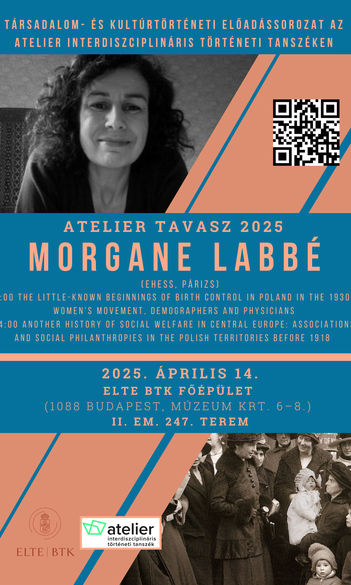Morgane Labbé visit's us to continue the Spring 2025 series

Morgane Labbé (info) visit's us from the Ecole des Hautes Etudes en Sciences Sociales (EHESS) in Parsi to deliver two lectures as part of our Spring 2025 series.
Date: Both presentations will take place on the fourteenth of April (2025.04.14).
Location: ELTE BTK, Múzeum krt. 6-8, 247.
Presentation abstracts:
10:00
The little-known beginnings of Birth Control in Poland in the 1930s: women's movement, demographers and physicians / Les début méconnus du Birth Control en Pologne dans les années 1930 : mouvement des femmes, démographes et médecins
Between the wars, Poland was described in demographic studies and international conferences as an overpopulated country. This talk describes how, in the early 1930s, three new changes lifted the Malthusian trap. One, in the field of demography, following a new biological approach to reproduction, launched a national survey on the birth rate, capturing the spread of contraceptive practices. The second change was a movement launched by members of an urban intelligentsia, that brought together writers and publicists, as well as doctors, in a common cause for "sexual reform", and women's right to choose their maternal and matrimonial life. The third change was due to another group of women's activists who linked the emancipation of working-class women and birth control practices along the lines of the Anglo-Saxon birth control movement.
14:00
Another history of social welfare in Central Europe: Associations and social philanthropies in the Polish territories before 1918 / Une autre histoire de la protection sociale en Europe centrale : Associations et philanthropies sociales dans les territoires polonais avant 1918
The history of social protection in Eastern and Central Europe remains little studied, what is striking in comparison with the voluminous historiography on the Western countries. This “missing history” are related to the premise of the dominant theories of the welfare state that has been built from the historical experiences of the Western countries. The talk argues that these theories are irrelevant for understanding the history of social welfare in Eastern Europe, given their focus on the state in the emergence of a welfare system and their assumptions on the social rights as an extension of the political and civil rights. In contrast to this classical state-centered history, I emphasize the innovative and pioneering role of private and local actors (voluntary associations, charities, philanthropies, municipalities...) in the emergence of the welfare state. I will develop this argument through a case study, a social philanthropy in the Polish city of Lodz at the beginning of the twentieth century that provided newborns from poor families with milk, care, and advice for their mothers. I show how the association became professional in its field and how it anticipated the child care policies of the new state in 1918. This specific trajectory suggests a more specific trajectory in terms of mixed welfare.



